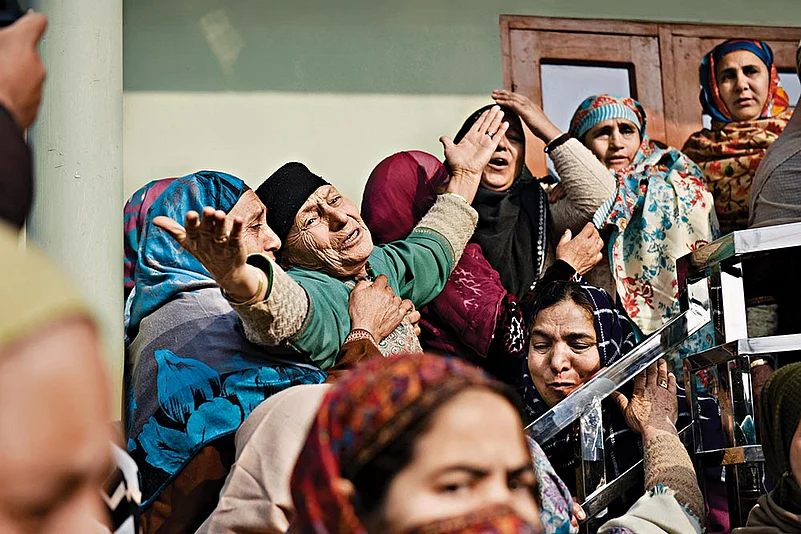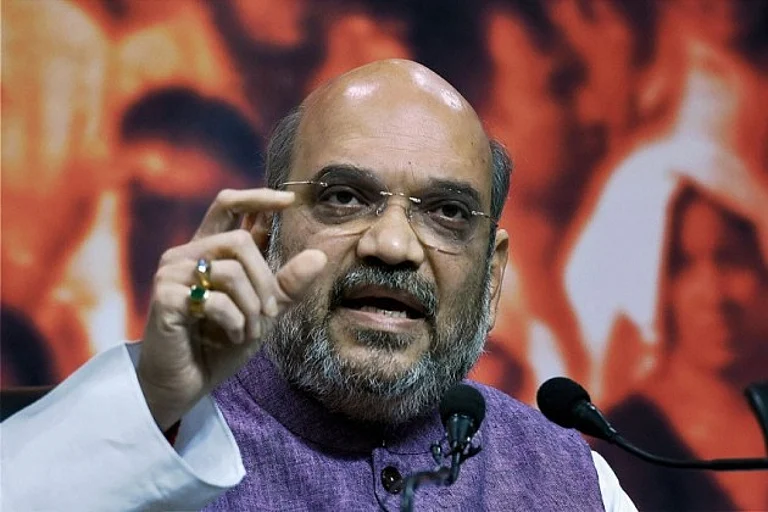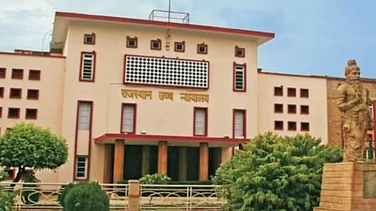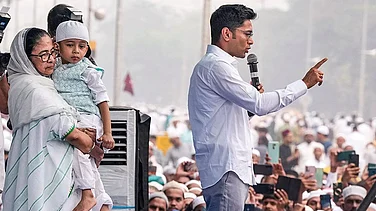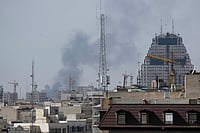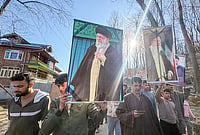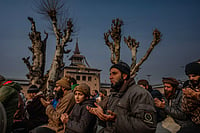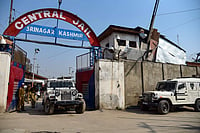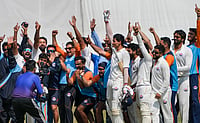
Among those who died were three forensics experts, two photographers and two revenue officials. They were handling a huge cache of explosives recovered in the Valley while probing the Delhi terror attack on November 10, 2025.
Before the blast close to Red Fort, the police in Nowgam had come across posters of terrorist groups threatening the security forces.
Three Nowgam residents were among those arrested. The police claim to have busted a network of al-Qaeda affiliate Ansar Ghazwat-ul-Hind and the Jaish-e-Mohammad.
A few metres from a playground in Srinagar’s Natipora, young Kashmiri men are playing a game of cricket. Muzamil Maqbool Rather, 33, looks petrified recalling the burial of his brother-in-law, Suhail Ahmad Rather, a numberdar. “We recognised Suhail’s body by his face at the police control room after hours spent running from one hospital to another,” says Muzamil, surrounded by mourning relatives and neighbours. A blast was triggered accidentally at the Nowgam police station on November 14, Jawaharlal Nehru’s birthday, which is celebrated as Children’s Day. Eight others, too, died in the blast and at least 30 were injured.
Among those who died were three forensics experts, two photographers and two revenue officials. They were handling a huge cache of explosives recovered in the Valley while probing the Delhi terror attack on November 10, 2025. The explosive was kept in an open area of the Nowgam police station for forensic examination. The blast blew away the left side of Suhail’s body, including a leg. Muzamil could hear the deafening boom at his home a kilometre away in Bag-i-Mehtab.
Suhail died on the night of November 14. The numberdars of Kashmir play a key role in civic life—as a link between the locals and the administration. “The family lost its only hope,” Muzamil says. “The other son has mental issues. Suhail also ran a centre where we could get documents photocopied or avail government services.” The numberdar had been called to prepare a record of explosives seized across the Valley. Nowgam residents even 2 km away could see plumes of smoke rising from the burning police station through the night, amid the roar of fire tenders and vehicles of security forces.
On Sunday, the small lane in crowded Natipora witnessed heavy traffic as MLAs and Javid Ahmad Dar, a minister in the Union Territory administration, visited the family, while Muzamil was at the Nowgam police station, to report the loss of Suhail’s SIM card. “The phone may have been damaged in the blast, but we don’t want any trouble,” says Muzamil, possibly worried over the SIM card’s misuse as terrorists have used lost SIMs in the past.
Before the blast close to Red Fort, the police in Nowgam had come across posters of terrorist groups threatening the security forces. The probe, the police said, led to a cache of 2,900 kg of explosive, chemicals, reagents, inflammable material, electronic circuits, batteries, wires, remote control, timers, metal sheets, two pistols, an AK-56 and an AK Krinkov rifle, besides ammunition, in Faridabad, Haryana. Three Nowgam residents were among those arrested. The police claim to have busted a network of al-Qaeda affiliate Ansar Ghazwat-ul-Hind and the Jaish-e-Mohammad.
“There are a few hundred houses near the Nowgam police station and many were damaged,” says Jawahar Ahmad Wani, a Nowgam resident. “The explosive should have been handled at a safer place. Since a fire incident was reported at the premises a few years ago, we have been demanding that the station be shifted to a safer place.”
The authorities have ordered a probe. J&K Lt Governor Manoj Sinha said they would “ascertain the cause of the accidental explosion”. Director General of Police, Nalin Prabhat, too, termed the incident “accidental”. “The recovery was kept securely at the open area of the police station,” DGP Prabhat told reporters. “As part of the prescribed procedure, samples had to be forwarded for further forensic and chemical examination. Due to the volume, this process was being carried out for the past two days by the Forensic Science Laboratory team.”
***
An old man with a long, white beard recites verses from the Quran on the inevitability of death as Shahid Shafi, the 22-year-old son of Nowgam’s local tailor, sits in a corner of the room. Shahid’s father, Mohammad Shafi Parray, had died in the police station blast less than 48 hours ago. Shahid, who had seen his father work hard for his three children, recalls the police calling Parray before the Friday congregational prayers and again in the evening to sew bags for sorting out the explosive. Neighbours heard his mother’s screams and learnt Parray was among the dead.
Shahid says they first went to a private healthcare facility just across the highway that saw heavy deployment of security forces and sees regular movement of army convoys. Later they went to the Shri Maharaja Hari Singh Hospital in Karan Nagar, where they identified the body. Parray was buried the next day. “It was my worst night,” says Shahid. His uncle says the family lost its only breadwinner.
A lane connects Shahid’s home to a wide road that remains blocked a day after the blast. People are seen vainly pleading to be allowed to meet the bereaved family or their kin whose houses were damaged. On the fateful day, there had been frantic scenes as people rushed to the nearby private hospital to look for dead or injured relatives. There were also people with mental distress, says Dr Neelam Aejaz, the resident medical officer who lives in Nowgam. “The blast sounded like a sonic boom from my house,” she recalls. A few window panes of her workplace 500 metres from the blast site were smashed.
Nearly an hour’s drive from Nowgam, in South Kashmir’s Pulwama, is the house of Dr Muzamil Shakeel, an accused in the Delhi blast case. Security forces had raided it before the blast, inquiring about the family’s wealth. Shakeel’s sister, Asmat Shakeel, was asked how they built the house. “Our family harvests a decent crop of apples annually from our orchards,” says Asmat, a doctor who did her MBBS in Bangladesh.
Her detained brother studied at a Jammu medical college before joining the Sher-i-Kashmir Institute of Medical Sciences in Soura, Srinagar, and then moved to Al Falah University in Faridabad. “I used to consult my brother about my studies. I can’t believe he had a hand in the Delhi blast,” she says. Her brother was arrested on October 29. Her wedding has been postponed.
A few streets away, Ghulam Nabi Bhat, father of 34-year-old Dr Umer-un-Nabi, who allegedly drove a car packed with explosives through the streets of the national capital before it blew up near Red Fort, sits in the courtyard of his demolished home. He had given DNA samples to match with his son’s mortal remains, though he denies his hand in the Delhi blasts. On November 16, the National Investigation Agency said it had forensically confirmed that Umer, an assistant professor of general medicine at Al Falah University, was the Delhi suicide bomber.
Bhat describes his son as a hard-working student who got admission in a veterinary science programme before bagging a seat at Srinagar’s Government Medical College. “My son wouldn’t raise a stick against anyone; how could he have carried out the blast?” he asks.
In Bemina, another Srinagar neighbourhood, people have gathered to mourn the death of Mohammad Amin Mir, 46, a forensic expert tasked to examine the seized explosive. His wife and two sons aged 10 and 12 learnt of his death eight hours after the blast. The family has been in shock since burying his body in bits, and a face they could identify only due to the false teeth and a scar on his neck.
“It was only after officials of the FSL came to our house that we learnt about the incident,” says Amin’s brother, Mohammad Sikandar Mir. “Possibly wary we might not handle a shock, they told us he was injured.”
On the street outside their house, security personnel zip past vendors. Raids have been stepped up, including on members of the outlawed Jamaat-e-Islami, to dismantle the “militant ecosystem and its support structures”.
“Incriminating materials were recovered. Several individuals associated with the Jamaat were questioned and some were booked under relevant sections of the law,” the police said.
MORE FROM THIS ISSUE
Ishfaq Naseem is senior special correspondent, Outlook. He is based in Srinagar
This article appeared as 'A Case Of Exploding Questions' in Outlook’s December 1, 2025 issue as 'The Burden of Bihar' which explores how the latest election results tell their own story of continuity and aspiration, and the new government inherits a mandate weighted with expectations. The issue reveals how politics, people, and power intersect in ways that shape who we are—and where we go next.






